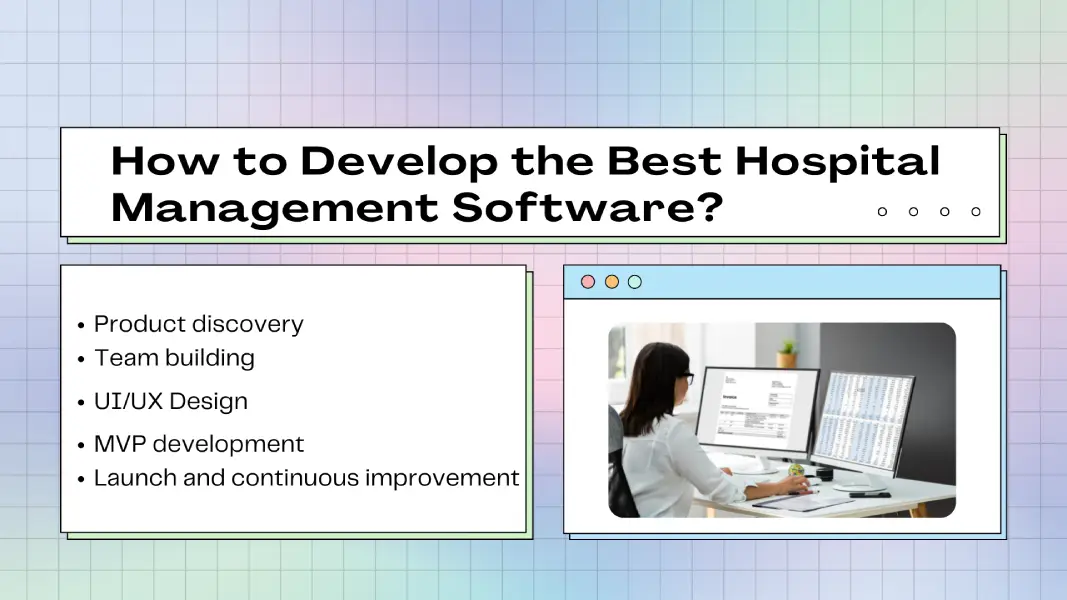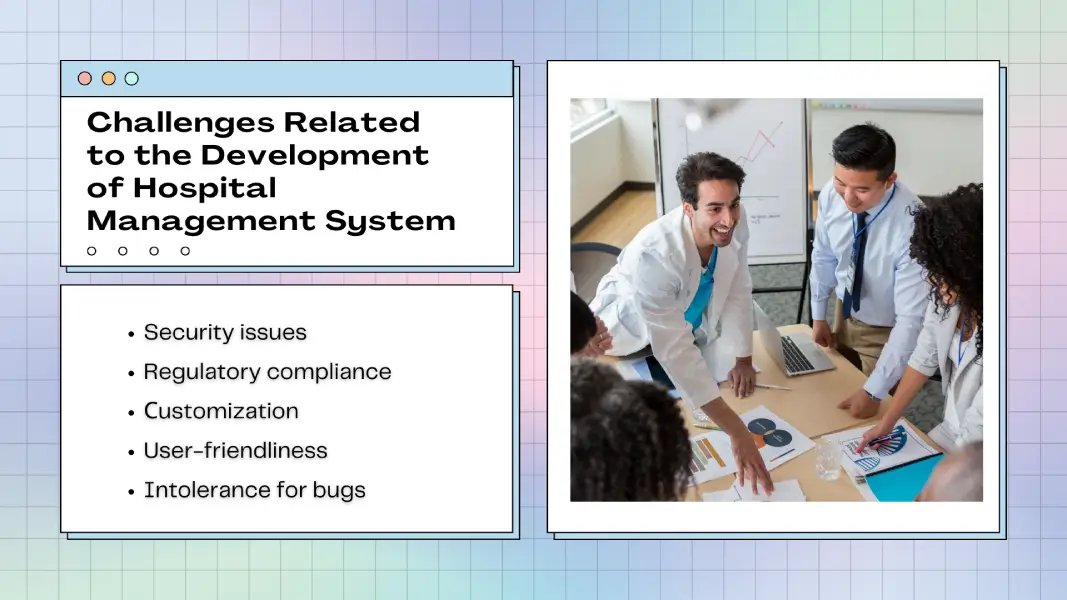The operation of healthcare facilities goes far beyond usual doctor-patient interaction. Any hospital is a complicated system. It employs numerous staff and consists of multiple departments. To work efficiently a hospital should implement diverse processes including inventory tracking, supply management, financial allotment, resource assignment, and many others. To introduce efficient workflow and have everything under complete control, hospital management software or HMS is used. A custom HMS can significantly optimize all internal processes taking a hospital to the next level. So let’s consider hospital management systems and their development in detail.
What is Hospital Management Software?
First of all, let’s figure out what a hospital management system is. HMS is cloud-based or on-site software designed for different healthcare institutions for medical, administrative, and financial data collection, storage, processing, and management. Today, implementation of HMS is indeed compulsory as it helps to automate numerous routine tasks and processes. As a rule, hospital management systems are leveraged by three main categories of users that are medical staff (doctors, nurses, etc.), hospital administration, and patients.
The set of features provided by hospital management systems significantly varies and depends on the workflow, needs, and budget of a particular hospital.
Benefits of Hospital Management Software
A great number of healthcare facilities have arrived at the decision to create a custom HMS. While this requires a substantial upfront investment, the value that such a system brings just cannot be overestimated. So let’s have a look at the benefits that a hospital can reap from the implementation of HMS.
Reduced staff workload and burnout
Hospital management software automates numerous hospital processes and tasks considerably reducing the scope of work medical staff have to do. By implementing this software a hospital can eliminate redundant processes, enhance efficiency, and allow doctors and nurses to concentrate on caring for patients instead of struggling with boring paperwork.
A decent healthcare management system can considerably cut down expenses on various processes and activities by automating them. For example, HMS can optimize the submission of insurance claims, patient registration, supply handling, laboratory management, etc.
Efficient strategic development
With a well-thought-out hospital management system, a big picture can be seen, and all processes can be taken under control. Consequently, it is possible to make informed decisions on strategic development and continuously improve the performance of a healthcare institution.
Better customer satisfaction
HMS gives a great opportunity to provide patients with superior healthcare services. Fast and hassle-free admission, discharge, and transfer along with patient-centric service make customers’ experience much more pleasant. There is no need to mention that high customer satisfaction contributes to the reputation of a healthcare institution.
Implementation of an HMS streamlines communication between medical staff and different departments by providing them with access to a centralized area for data sharing. Physicians can easily find medical history, check lab tests, or get in touch with the nursing staff. The latter can check with a click of a button availability of wards, operating rooms, medicines, etc. With such a system everyone can get in touch with a certain department and quickly receive information when necessary.
Easy expense tracking and management
A hospital management system lets you have under control all expenses allowing for an efficient budgeting process which is important for every organization.
Efficient data management
With a good HMS, every staff member can easily add information, update it or retrieve it whenever needed. Consequently, it is possible to quickly get relevant and up-to-date information.
Vital Features of a Hospital Management Solution
We have already mentioned that the scope of features offered by different HMS can vary. However, we would like to draw your attention to the features of hospital management system that are supposed to be immensely useful:
First of all, HMS should be an efficient tool for inpatients and outpatients management. With its help, hospital staff should be able to organize quick patient admission and discharge, collect and store medical histories, treatment plans, and data on previous visits or upcoming appointments.
This feature will enable a hospital to keep an eye on the availability of beds, wards, operating rooms, and other premises.
The system should also provide relevant information on the workforce including, specialization, responsibilities, schedules, and many more. This is important in order to efficiently organize work and assign tasks. Moreover, with this feature, it is easy to track the performance and specific skills of the staff.
Supply management is important when it comes to handling inventory. With this feature, it is possible to track the number of supplies, their location in a facility, storage life, and others.
A lab is an essential department for any hospital. Lab tests are of great importance for accurate diagnosing or treatment. Consequently, lab management is among the basic hospital management software features. It optimizes the laboratory workflow, ensuring that samples are delivered to a laboratory on time. It also gives an opportunity to properly record and organize test results making them quickly available to doctors.
Billing and finance management
This functionality helps to track and control all financial operations, including patient billing, insurance claim submission, budget allocation, spending, etc.
A decent HMS should generate reports as they give an opportunity to get valuable insights on how to enhance the performance of a healthcare institution. It is important to provide stats on patients, doctors, stock items, and finances.
How to Develop the Best Hospital Management Software?
Every product team may opt for its own approach to the development process. Still, we want to define some steps or even rather aspects of HMS development that deserve attention.
Foremost, it is critical to clearly define the key objectives of future software. For this purpose, you should determine, study, and analyze hospital processes, needs, and challenges. It is also advised to communicate with target users as well as analyze hospital management systems that are already available on the market. The received insights will help you validate your product concept.
A hospital management system is a rather specific software product. Thus, to develop the best hospital management system, you should bring together professionals with corresponding domain expertise. Your team should consist of seasoned developers, architects, UI/UX designers, QA engineers, business analysts, project managers, and subject matter experts. The engagement of the latter is compulsory as they will help to validate a product and ensure your team's being on the right track.
UI/UX design is as important as a set of provided features. This rule is applicable for software of any kind. So, the best hospital management software should have a simple and intuitive design that would provide great usability and user experience. Take into account that even technology-challenged people should be able to easily use it.
We strongly advise you to start with the development of a minimum valuable product (MVP). In such a way you can validate your idea, get quick feedback from real users, and attract investors. Remember that MVP includes only key features while still being subject to regulatory compliance about which we will talk later.
Launch and continuous improvement
Once the MVP is ready, you can deliver your hospital management solution to the market. After that, you can continuously improve it by updating existing features and adding new functionality. Still, it should be done with due regard to feedback received from doctors, nurses, patients, and administrative staff.
Challenges Related to the Development of Hospital Management System
Any HMS is a sophisticated system. Additionally, there are multiple high demands for software of this kind. All these give a rise to certain challenges that should be considered before jumping into the HMS development process.
Healthcare applications are deemed to be the main target of cybercriminals. Therefore, it is crucial to craft your hospital management software considering all security measures helping to firmly protect sensitive patient data. In these terms, it is advised to implement role-based access control, multi-factor authentication, automatic log-offs, data encryption, activity tracking system, PHI backup, and others.
As long as secure data protection is a must for healthcare applications of all types, your HMS should also comply with certain state norms and regulations defining security standards. For example, if your HMS targets the USA market, you should design and develop an HMS with the demands of HIPAA in mind. Non-compliance with these regulations may result in heavy penalties.
Customization is very important for hospital management systems since internal management and administration processes vary from one healthcare facility to another. So your HMS should be easily customized in accordance with the requirements and objectives that different hospitals may have.
We have already said that the UI/UX design of hospital management solutions should be plain and intuitive to provide a great user experience. While an HMS is rather complex it is a real art to make it as easy to use as possible. Only an HMS with a low learning curve can be well accepted by real users. So make sure that your UI/UX design is indeed well-thought-out.
One of the main challenges associated with healthcare software is a lack of tolerance for bugs. Users put forward high demands on such apps and expect a high level of quality. In such a way it is necessary to think over every detail and comprehensively test your HMS inside out.
Bottom line
Today more and more healthcare facilities are getting digitized. They have optimized their workflow with ready-made or custom hospital management solutions or hospital ERP systems.
A decent HMS should be secure, full-fledged, customized, user-friendly, and bug-free. Creating good hospital management software suggests having in-depth development expertise along with profound knowledge of the hospital workflow. Devico is a full-service software development company whose team has all the needed skills and experience for crafting HMS and healthcare applications of other kinds. So do not hesitate to contact us in order to get more details.






